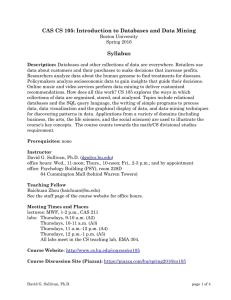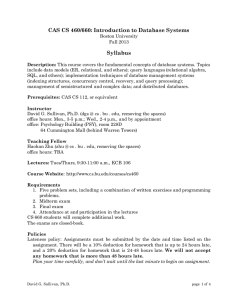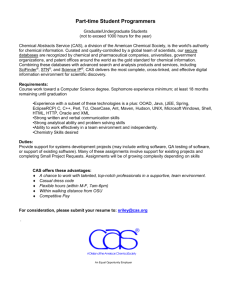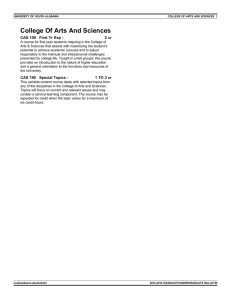CAS CS 105: Databases & Data Mining Syllabus, Boston University
advertisement
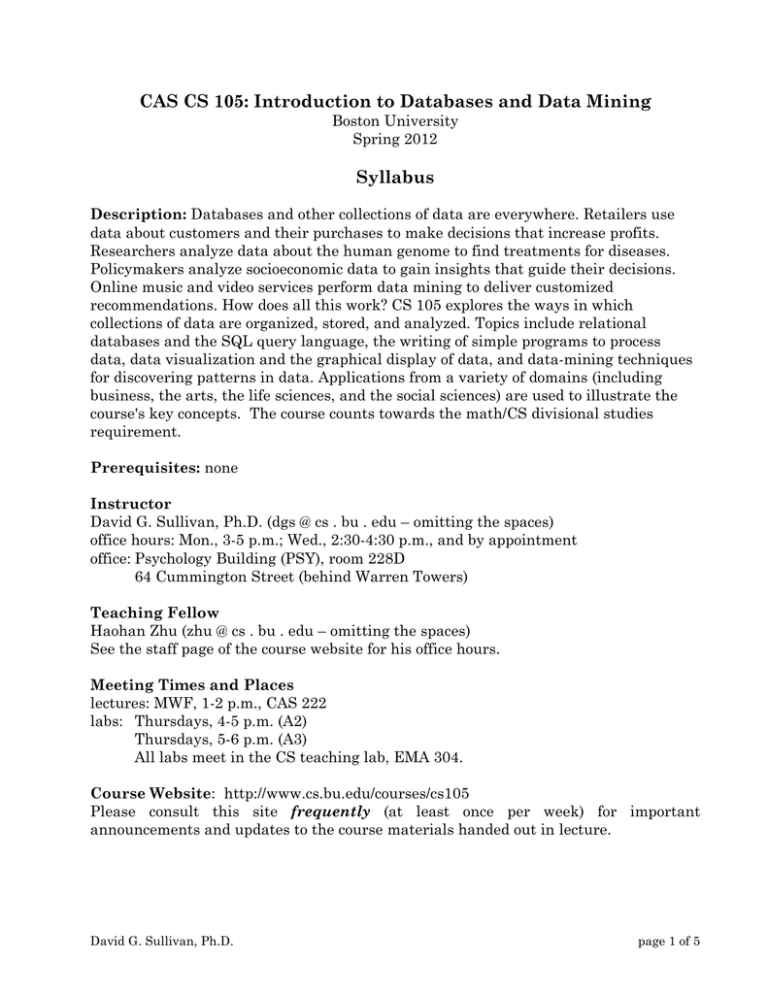
CAS CS 105: Introduction to Databases and Data Mining Boston University Spring 2012 Syllabus Description: Databases and other collections of data are everywhere. Retailers use data about customers and their purchases to make decisions that increase profits. Researchers analyze data about the human genome to find treatments for diseases. Policymakers analyze socioeconomic data to gain insights that guide their decisions. Online music and video services perform data mining to deliver customized recommendations. How does all this work? CS 105 explores the ways in which collections of data are organized, stored, and analyzed. Topics include relational databases and the SQL query language, the writing of simple programs to process data, data visualization and the graphical display of data, and data-mining techniques for discovering patterns in data. Applications from a variety of domains (including business, the arts, the life sciences, and the social sciences) are used to illustrate the course's key concepts. The course counts towards the math/CS divisional studies requirement. Prerequisites: none Instructor David G. Sullivan, Ph.D. (dgs @ cs . bu . edu – omitting the spaces) office hours: Mon., 3-5 p.m.; Wed., 2:30-4:30 p.m., and by appointment office: Psychology Building (PSY), room 228D 64 Cummington Street (behind Warren Towers) Teaching Fellow Haohan Zhu (zhu @ cs . bu . edu – omitting the spaces) See the staff page of the course website for his office hours. Meeting Times and Places lectures: MWF, 1-2 p.m., CAS 222 labs: Thursdays, 4-5 p.m. (A2) Thursdays, 5-6 p.m. (A3) All labs meet in the CS teaching lab, EMA 304. Course Website: http://www.cs.bu.edu/courses/cs105 Please consult this site frequently (at least once per week) for important announcements and updates to the course materials handed out in lecture. David G. Sullivan, Ph.D. page 1 of 5 CAS CS 105: Introduction to Databases and Data Analysis Syllabus Spring 2012 Requirements 1. Nine problem sets 2. A final project, which will involve using the techniques covered in the course to organize and analyze a collection of data that interests you, to draw conclusions based on your analysis, and to present your results in a clear and compelling way 3. Three closed-book quizzes 4. A closed-book final exam 5. Attendance at and participation in both the lectures and labs Policies Lateness policy: Assignments must be submitted by the date and time listed on the assignment. There will be a 10% deduction for homework that is up to 24 hours late, and a 20% deduction for homework that is 24-48 hours late. We will not accept any homework that is more than 48 hours late. Plan your time carefully, and don’t wait until the last minute to begin an assignment. Starting early will give you ample time to ask questions and obtain assistance from members of the course staff. Determining the final grade: attendance/participation problem sets final project quizzes final exam 10% 30% 10% 20% 30% Extensions and makeup quizzes/exams will only be given in documented cases of serious illness or other emergencies. You cannot redo or complete extra work to improve your grade. Incompletes will not be given. Collaboration Policy* The collaboration policy for this class is as follows. • You are strongly encouraged to collaborate with one another in studying the textbook and the lecture material. • As long as it satisfies the following conditions, collaboration on the homework assignments is encouraged and will not reduce your grade: 1. Before discussing each homework problem with anyone else, you must give it an honest half-hour of serious thought. 2. You may discuss ideas and approaches with other students in the class, but not share actual code or solutions to other types of problems. In other words, the work you submit must be entirely your own, which you must complete without looking at other people's work, and you must not permit others to copy your work. You must also acknowledge clearly in the appropriate portion of your solutions (e.g., in the comments of your code) people with whom you discussed ideas for that portion. David G. Sullivan, Ph.D. page 2 of 5 CAS CS 105: Introduction to Databases and Data Analysis Syllabus Spring 2012 3. You may get help from the teaching staff and from tutors in the lab for specific homework problems. Don't expect them to do it for you, however. 4. If you get really stuck with a bug in a program (defined roughly as over an hour of frustration), you are allowed to get help from a friend as long as you acknowledge that help clearly in your solutions (e.g., in the comments of your code). 5. You may not work with people outside this class (but come and talk to us if you have a tutor), seek online solutions, get someone else to do it for you, etc. • You are not permitted to collaborate on exams. The last point is particularly important: if you don't make an honest effort on the homework but always get ideas from others, your exam score will reflect it. Violations of Collaboration Policy* Violations of collaboration policy fall into two categories: ones that are acknowledged at the time they occur (for example, in clearly marked comments in your code) and ones that are unacknowledged. Acknowledged violations (e.g., using someone else's code for a method you didn't know how to write yourself, and stating clearly in your code that this is not your own work) will result in an appropriate reduction in the grade, but will not be considered cheating. You should send an email to cs105-staff @ cs . bu . edu about all such violations, or anything that you think may possibly be considered as such. Unacknowledged violations of the collaboration policy—for example, not stating the names of your collaborators, or any other attempt to represent the work of another as your own—will result in an automatic failing grade and will be reported to the Academic Conduct Committee (ACC). The ACC often suspends or expels students deemed guilty of plagiarism or other forms of cheating. We will assume that you understand the CAS Academic Conduct Code, copies of which are available in room CAS 105. If you are uncertain as to whether a particular kind of interaction with someone else constitutes illegal collaboration or academic dishonesty, please ask Dr. Sullivan before taking any action that might violate the rules; if you can't reach him in time, then at the very least include a clear explanation of what happened in your homework write-up to avoid being treated as a cheater. Citing your sources is usually the easiest way out of trouble. * Thanks to Prof. Leo Reyzin, who wrote the original versions of the sections describing the collaboration policy and violations to that policy. I have made only minor modifications. David G. Sullivan, Ph.D. page 3 of 5 CAS CS 105: Introduction to Databases and Data Analysis Syllabus Spring 2012 Textbooks We will provide lecture notes that fully cover all of the material you are expected to learn as part of the course. However, you may wish to consider purchasing: • Database Concepts, 5th edition by David M. Kroenke (Prentice Hall, 2011) • Python Programming: An Introduction to Computer Science, 1st edition by John Zelle (Franklin Beedle Publishing, 2004) These books will be available for purchase at Barnes & Noble. Schedule (tentative) week lecture dates 1 1/18, 1/20 2 1/23, 1/25, 1/27 3 1/30, 2/1, 2/3 4 2/6, 2/8, 2/10 5 2/13, 2/15, 2/17 6 2/21, 2/22, 2/24 7 2/27, 2/29, 3/2 8 3/5, 3/7, 3/9 9 3/10-3/18 3/19, 3/21, 3/23 David G. Sullivan, Ph.D. topics, exams, and special dates Course overview and introduction Database fundamentals No lab meetings this week The relational model: How is data organized in a typical database? SQL: a language for creating, modifying, and extracting data from a database SQL (cont.) Problem Set 1 due on 2/1 1/30: last day to add a class SQL (cont.) case study: an astronomical database Problem Set 2 due on 2/8 Programming in Python: intro., working with numbers Problem Set 3 due on 2/15 More Python: making decisions Quiz 1 on 2/22 Problem Set 4 due on 2/24 (Friday) No lecture on 2/20 (Presidents' Day) Lecture on Tues. 2/21 (Mon. schedule) 2/21: last day to drop without a 'W', and to change from credit to audit status More Python: working with strings/text and lists; accessing a database Problem Set 5 due on 2/29 More Python: working with data stored in a text file Problem Set 6 due on 3/7 Spring break Data visualization: how to create compelling and useful data graphics Problem Set 7 due on 3/21 optional readings K (Kroenke): chap. 1 K: chap. 2, 3 K: chap. 2, 3 see above Z (Zelle): chap. 1, 2, 3 Z: sect. 7.1-7.3 Z: sect. 4.1-4.5 Z: sect. 4.6 page 4 of 5 CAS CS 105: Introduction to Databases and Data Analysis Syllabus 10 3/26, 3/28, 3/30 11 4/2, 4/4, 4/6 12 4/9, 4/11, 4/13 13 4/18, 4/20 14 4/23, 4/25, 4/27 15 4/30, 5/2 David G. Sullivan, Ph.D. Spring 2012 Data mining: what is it? How can a computer learn to categorize things? Quiz 2 on 3/26 3/30: last day to drop a class with a 'W' More data mining: categorizing things (cont.), finding patterns in numeric data Problem Set 8 due on 4/4 Final-project proposal due on 4/6 More data mining: preparing data for mining, discovering arbitrary relationships in your data Work on final project More data mining: discovering relationships (cont.); case study Problem Set 9 due on 4/20 (Friday) No lecture on 4/16 (Patriots' Day) 4/18 is a Mon. schedule Case studies and/or project presentations Quiz 3 on 4/25 Case studies and/or project presentations Final projects due on 5/2 Final exam: Friday, 5/11, 3-5 p.m. page 5 of 5
